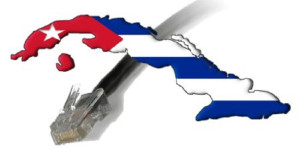BROWSE INTERNET IN CUBA WITHOUT THE INTERNET.
If you’ve ever complained about how slow is your internet, you have to see what they do in Cuba to see a serie/news.

A few months ago, before Netflix service open to everyone (except China), it made headlines the beginning of activities in Cuba, following the gradual lifting of the blockade that prevented US companies doing business on the island. The news held in many other countries, was met with sarcasm in Cuba, the country with the worst rate of connectivity in Latin America, and a digital environment to unprecedented levels controlled by the state.
Cubans are keeping up as series, movies and music through the clandestine service known as “package”
However, although most Cubans do not have Internet access (penetration is only 20% of the total population, and the cost of an hour’s connection is 5 to $ 7, when the average salary is about 500 pesos), especially an Internet that allows them to use streaming services, and television is broadcast in the country is controlled (all channels except the state are forbidden) Cubans are keeping up in their consumption of cultural products (series, movies and music) through the clandestine service known as “package”.
“Package” consists of a disc with a terabyte of information, including series, movies, news and applications for mobile, distributed weekly through a network of people who engage in trafficking these files illegally downloaded from the Internet, and also distributed illegally, regardless of state restrictions and prohibitions. Files movies, series and novels subtitled in Spanish the day after its release, PDFs of international newspapers, applications for Android and iOS: The package can contain everything a Cuban needs to keep up with the global culture.
Just as black markets flourish food, clothing or electronics despite, or perhaps motivated by state regulations, the law does not stop the clandestine entertainment system which, according to a recent report by Vox, almost all Cubans part.
Internet in Cuba.
According to Johnny Harris, Vox, there are two main leaders in distribution networks Package in Havana, who compete to have at their disposal the best weekly catalog of digital content, as quickly as possible. Subscription costs between one and three dollars a week, and customers receive the files directly to their homes or through an intermediary, usually in the back of a store, where they have a blank disk for files copied in this .
In turn, the leaders of these networks receive files from other people. As pointed Dany, one of these “creative entrepreneurs” there is a person responsible for each category of information (movies, series, music, etc.), but says not know how get the content. However, Cuba is relatively common that some people possess illegal satellite hidden inside water tanks. Through these, they can get the satellite signal from the open Internet and not censored by the government, but, as you know, satellite internet is terribly slow. It is also possible that the content is physically carried Cuba through people traveling from Miami.
Surprisingly, Cubans find a way to overcome the immense technological, legal, social and political barriers that restrict free access to the Internet and culture. So far, the government has tried to block the distribution of the package and distributors avoid include “anti-revolutionary, subversive or obscene” content to stay out of the problems that may arise. However, the whole operation is still illegal, in a country where lawlessness is simply a survival mechanism.
Hypertext / Marianne Diaz Hernandez / InternetPHotos / TheCubanHistory.com
The Cuban History, Hollywood.
Arnoldo Varona, Editor.
NAVEGAR EN INTERNET EN CUBA, SIN EL INTERNET.
Si alguna vez te has quejado de lo lento que es tu internet, tienes que ver lo que hacen en Cuba para poder ver una serie.
Hace algunos meses, antes de que Netflix abriera su servicio a todo el mundo (menos China), fue noticia su inicio de actividades en Cuba, tras el levantamiento gradual del bloqueo que impedía a empresas estadounidenses hacer negocios en la isla. La noticia, celebrada en muchos otros países, fue recibida con sarcasmo en Cuba, el país con la peor tasa de conectividad de América Latina, y un ambiente digital controlado a niveles inauditos por el Estado.
Los cubanos se mantienen al día en cuanto series, películas y música a través del servicio clandestino conocido como “el paquete”
Sin embargo, y aunque la mayoría de los cubanos no tienen acceso a Internet (la penetración es de apenas 20% del total de la población, y el costo de una hora de conexión es de 5 a 7 dólares, cuando el salario promedio es de alrededor de 500 pesos), en especial a un Internet que les permita hacer uso de servicios de streaming, y la televisión que se transmite en el país está controlada (todos los canales, excepto los estatales, están prohibidos) los cubanos se mantienen al día en cuanto a su consumo de productos culturales (series, películas y música) a través del servicio clandestino conocido como “el paquete”.
“El paquete” consiste en un disco con un terabyte de información, incluyendo series, películas, noticias y aplicaciones para el móvil, que se distribuye semanalmente a través de una red de personas que se dedican a traficar estos archivos, descargados ilegalmente de Internet, y distribuidos también ilegalmente, al margen de las restricciones y prohibiciones estatales. Archivos de películas, series y novelas subtitulados al español al día siguiente de su lanzamiento, PDFs de periódicos internacionales, aplicaciones para Android y iOS: El Paquete puede contener todo lo que un cubano necesita para mantenerse al día con la cultura global.
Del mismo modo que florecen mercados negros de alimentos, ropa o productos electrónicos a pesar, o quizás motivados, por las regulaciones del Estado, la ley no detiene el sistema clandestino de entretenimiento del cual, según un reciente reportaje de Vox, casi todos los cubanos forman parte.
Internet en Cuba.
Según Johnny Harris, de Vox, existen dos líderes principales en las redes de distribución del Paquete en la ciudad de La Habana, quienes compiten para tener a su disposición el mejor catálogo semanal de contenido digital, lo más rápido posible. La suscripción cuesta entre uno y tres dólares semanales, y los clientes reciben los archivos directamente en sus casas o a través de un intermediario, por lo general en la parte trasera de una tienda, a donde llevan un disco vacío para recibir en éste los archivos copiados.
A su vez, los líderes de estas redes reciben los archivos de otras personas. Según señala Dany, uno de estos “empresarios creativos”, existe una persona responsable por cada categoría de información (películas, series, música, etcétera), pero dice desconocer cómo obtienen el contenido. Sin embargo, en Cuba es relativamente común que ciertas personas posean satélites ilegales ocultos dentro de tanques de agua. A través de éstos, pueden obtener la señal satelital del internet abierto, no censurado por el gobierno, pero, como es sabido, el internet satelital es terriblemente lento. Es también posible que el contenido sea llevado a Cuba físicamente, a través de personas que viajan desde Miami.
Sorprendentemente, los cubanos encuentran la forma de sortear las inmensas barreras tecnológicas, legales, sociales y políticas que restringen su libre acceso al Internet y a la cultura. Hasta el momento, el gobierno no ha intentado bloquear la distribución de El Paquete, y los distribuidores evitan incluir contenido “antirrevolucionario, subversivo u obsceno”, para mantenerse al margen de los problemas que puedan surgir. Sin embargo, toda la operación sigue siendo ilegal, en un país donde la ilegalidad no es más que un mecanismo de sobrevivencia.
Hipertextual/Marianne Díaz Hernández/InternetPHotos/TheCubanHistory.com
The Cuban History, Hollywood.
Arnoldo Varona, Editor.



 BROWSE INTERNET IN CUBA without the Internet. + NAVEGAR EN INTERNET EN CUBA, sin el Internet.
BROWSE INTERNET IN CUBA without the Internet. + NAVEGAR EN INTERNET EN CUBA, sin el Internet.


